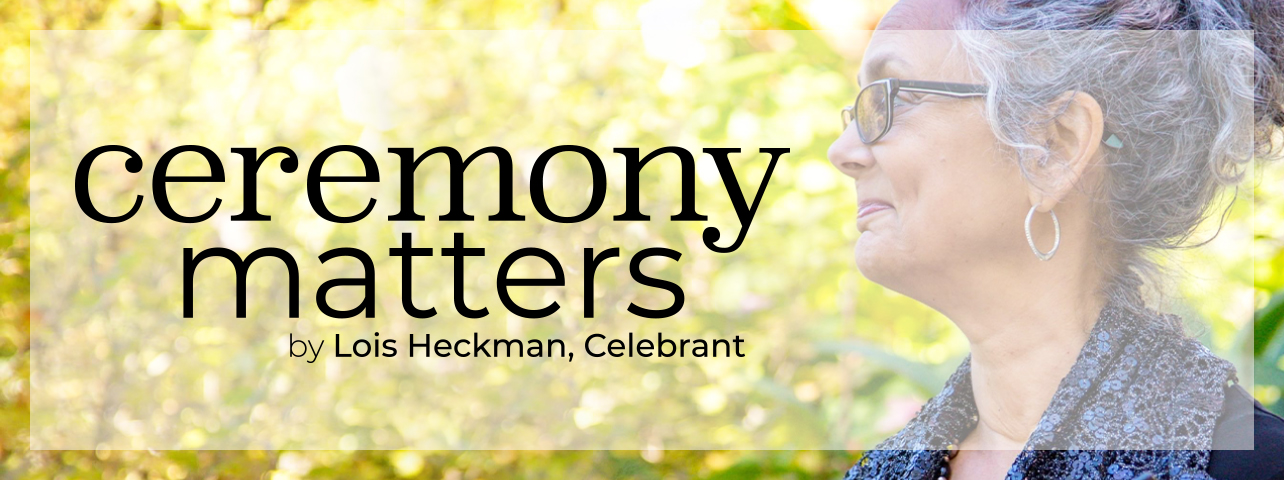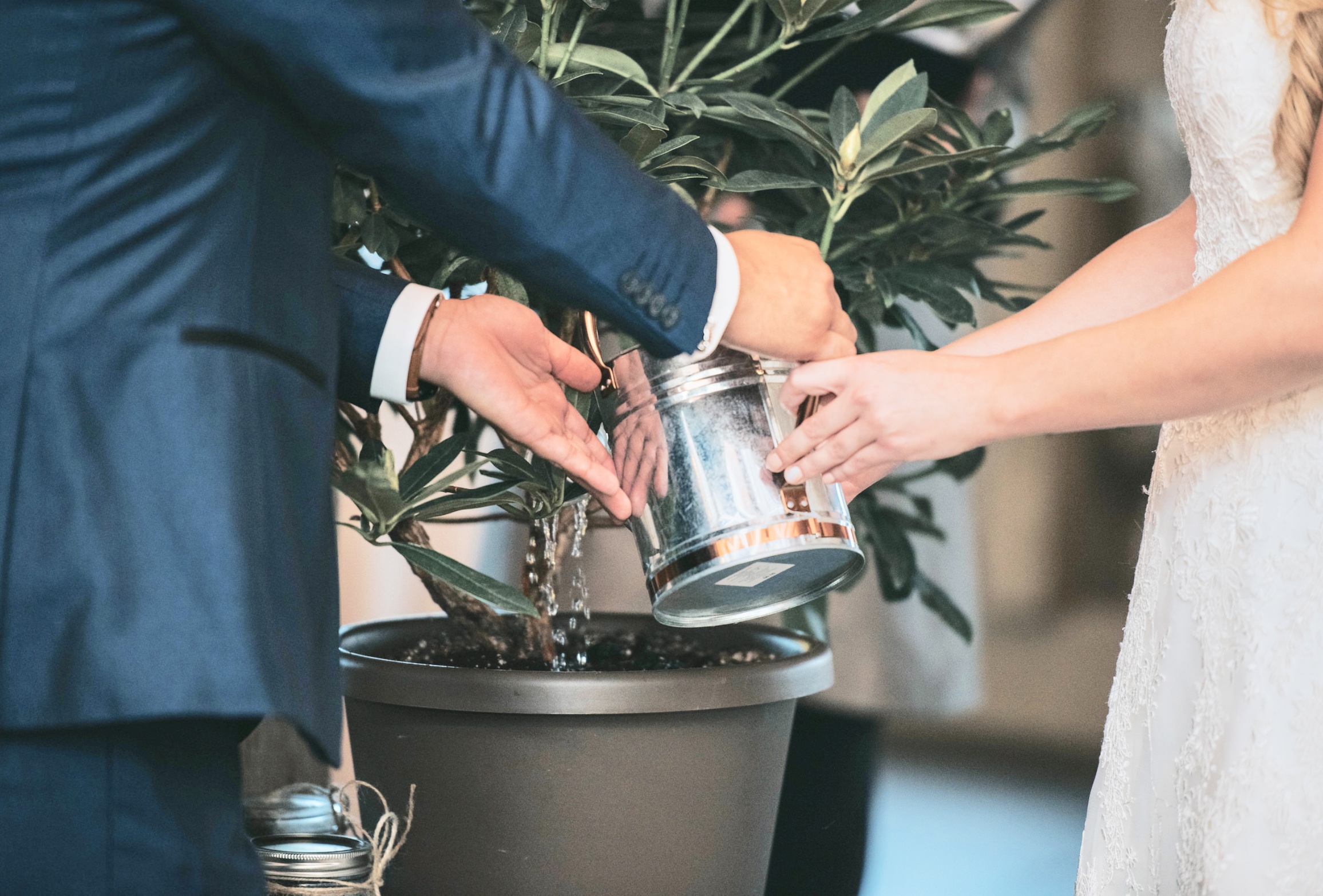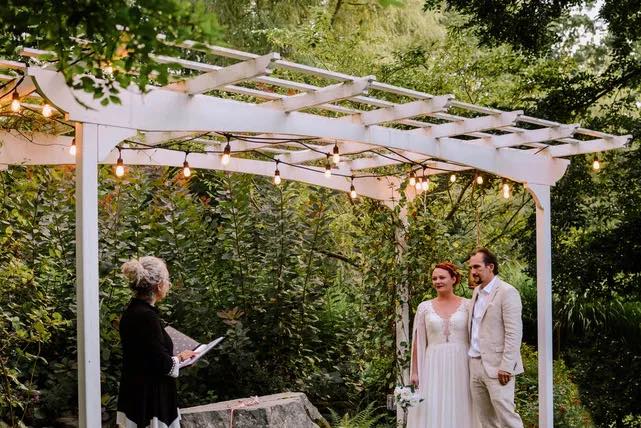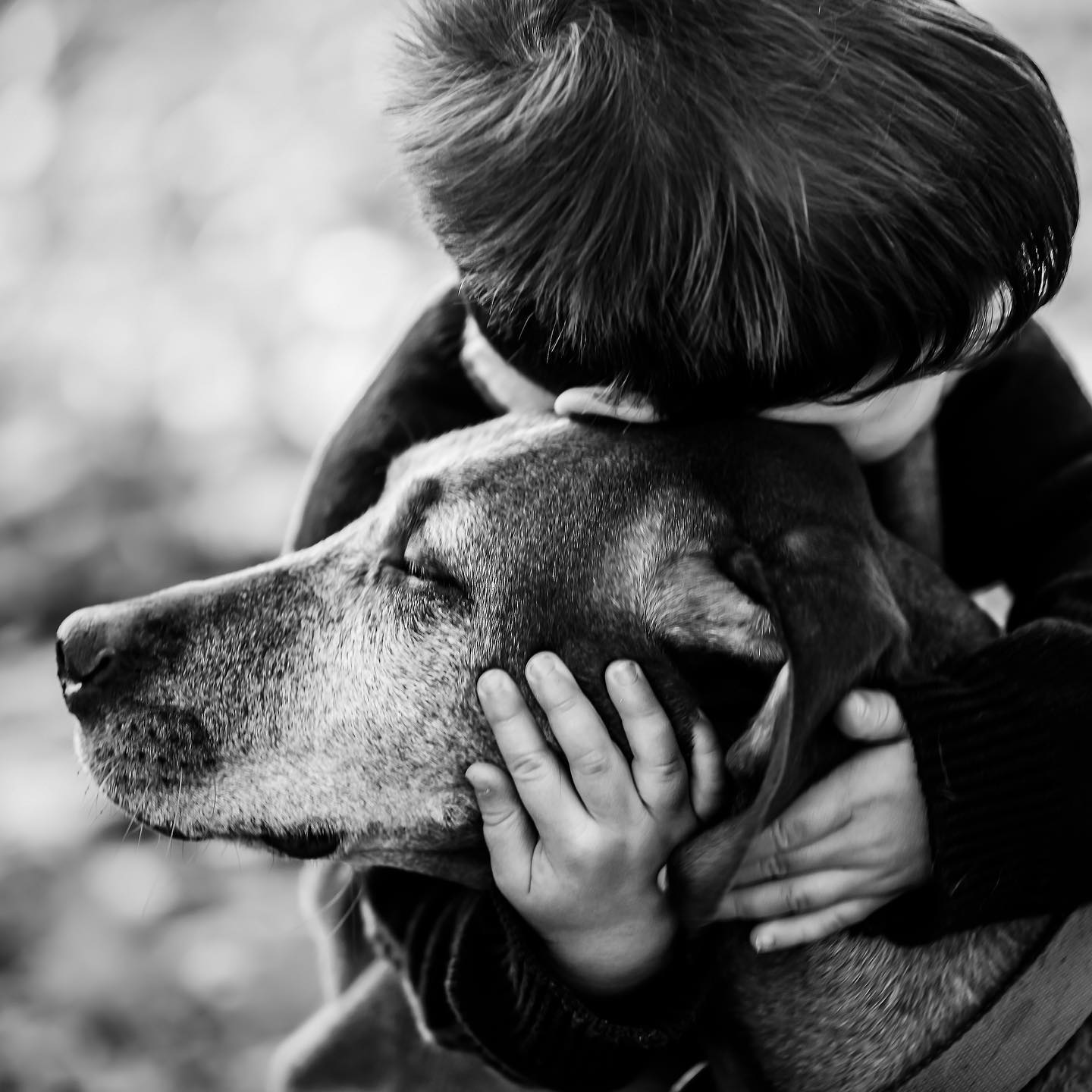Nothing brings people together more than these three things: birth, death and weddings.
In many ways all three are life-affirming, which may seem counter-intuitive for death – but funerals, being truly for the living, find people gathering who may not usually associate with one another.
Everyone, regardless of their beliefs, celebrates a birth in the family or community.
And of course – weddings. No matter how unlikely a couple may seem, if perhaps coming from different backgrounds or traditions, we gather for the ceremony and celebration to mark their commitment to one another and celebrate love, partnership and the possibilities of the future.
In these turbulent times it is good to remember that there are important things we do share. These three life milestones are certainly some of them. We all have more in common than what seems to divide us. We all want safety, security, and to be loved.
My calling as a Humanist Celebrant helps me bring families together for just those reasons. A meaningful and honest ceremony can address the things we too often leave unspoken. We can heal.
I recently officiated a ceremony for a couple who were focused in their relationship on the Japanese concept ‘Kintsugi’ which means Golden Rejoining.
In literal practice it is the art of repairing broken pottery by mending the cracks or breaks using a special gold material to repair it. Rather than trying to hide the flaws, it highlights them, because in life sometimes the repairing is what matters the most. And herein lies the philosophy. We often focus on what is broken in our lives and relationships, and our world - but we need to focus on how to repair it. And we cannot see clearly what is wrong until we open up the wound (break it open) to understand how to fix it.
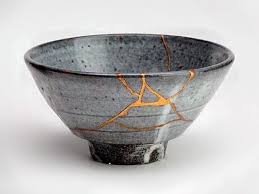
Judaism has a similar philosophy – that of ‘Tikkum olam’ – which means ‘repair the world.’ This form of repair is done by acts of social responsibility. In fact, many religions and philosophies teach similar concepts.
I wonder if we can repair the breaks in our society. How would that work? All I can do now is help in small ways, for those who come my way, looking for a service that celebrates the whole but might also repair what is broken.
If you’re a dog person and you’re planning a wedding, I’ll bet you’ve thought about having your pup or pups involved. So many dog-loving couples think about their fur baby walking down the aisle. But can it happen? Maybe. Before you take that leap there are several obstacles to consider. Read on!
To state the obvious: first and foremost is the well-being of your dog. Is the task a good fit for your (certainly perfect) pet? A jumping dog, a nervous dog, or a senior dog probably won’t work well, especially if you expect a little interaction with your guests. You need a well-trained, socialized dog to participate in your wedding. On the flip side, an overly friendly dog (like my Louie) might jump on someone, or just disrupt the proceedings.
And before you fall further in love with the idea, check with your venue to see if dogs are allowed on the property. Be prepared to ask and answer a few questions.
Will your dog will be allowed to stay with you if there is on-site accommodations?
Think about your time frame – will you have to leave her alone for too long when you go to your reception?
To facilitate this dream it is very helpful to have a designated handler for the dog.
The most popular task for a dog is the walk down the aisle, often as a ring bearer or flower dog, or just walk on in and be awesome. Here’s how it works: obviously, someone has to escort the pooch down the aisle – a flower girl or ring bearer, Jr Bridesmaid or Jr Groomsmen are great choices, but really anyone can fill the bill. Then, have your pup whisked away to the dog friendly pre-arranged location (or back home) after a nice walk and a cool drink of water, of course!
Having your dog stay throughout the ceremony could take the focus off of you! He had his moment, now it’s your turn. If you do want said dog to hang around for some post-ceremony photos, have her exit the ceremony site until it’s time for the photos or social interaction. Either way, your pup will probably leave before the reception. This is why the dog handler should not be a guest, but someone specifically designated and paid to do this important job. Yes, hiring someone gives it importance and accountability – so please consider that.
Including your dog in your photos is worthwhile. Engagement photos, wedding photos, or save-the dates, are all great opportunities for dogs to be their most adorable. The photos also provide a lifetime of memories.
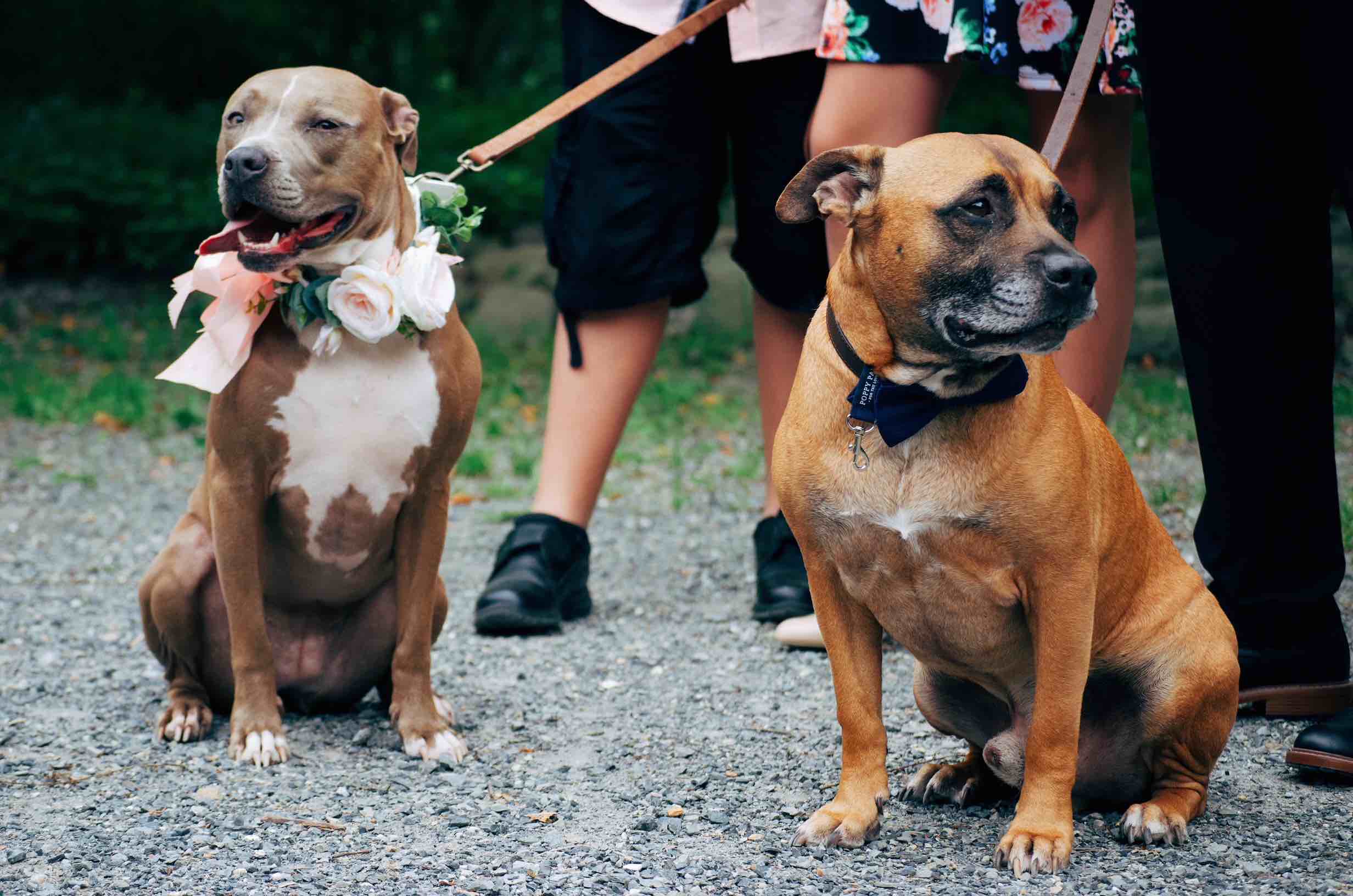
If you can’t arrange to have your dog with you at your wedding, consider including a few words about her in the ceremony, in the program book, or at the reception. How about using photos of your dogs incorporated into your table markers? (Side note: this is, in fact, probably the only way you could involve cats.) Take your pet’s photo, add a graphic, such as the table numbers, frame it, and place on the tables. Voilà!
How about a big cardboard cutout of your dog for photos or as photo-booth material?
You don’t have to dress up your dog, but some people do love that. Maybe just a special collar. You certainly want a freshly bathed and groomed dog for the big day. Schedule a spa day for your four legged friends as well as your two legged ones.
If you think this is all ridiculous, you’re probably not a dog person. And please give me a hand for not including all those silly dog puns! It was a ruff, ruff effort. It wasn’t too much of a fluff piece, was it? I gave you the real poop! Vow wow wow! It was pawsitively off the leash!
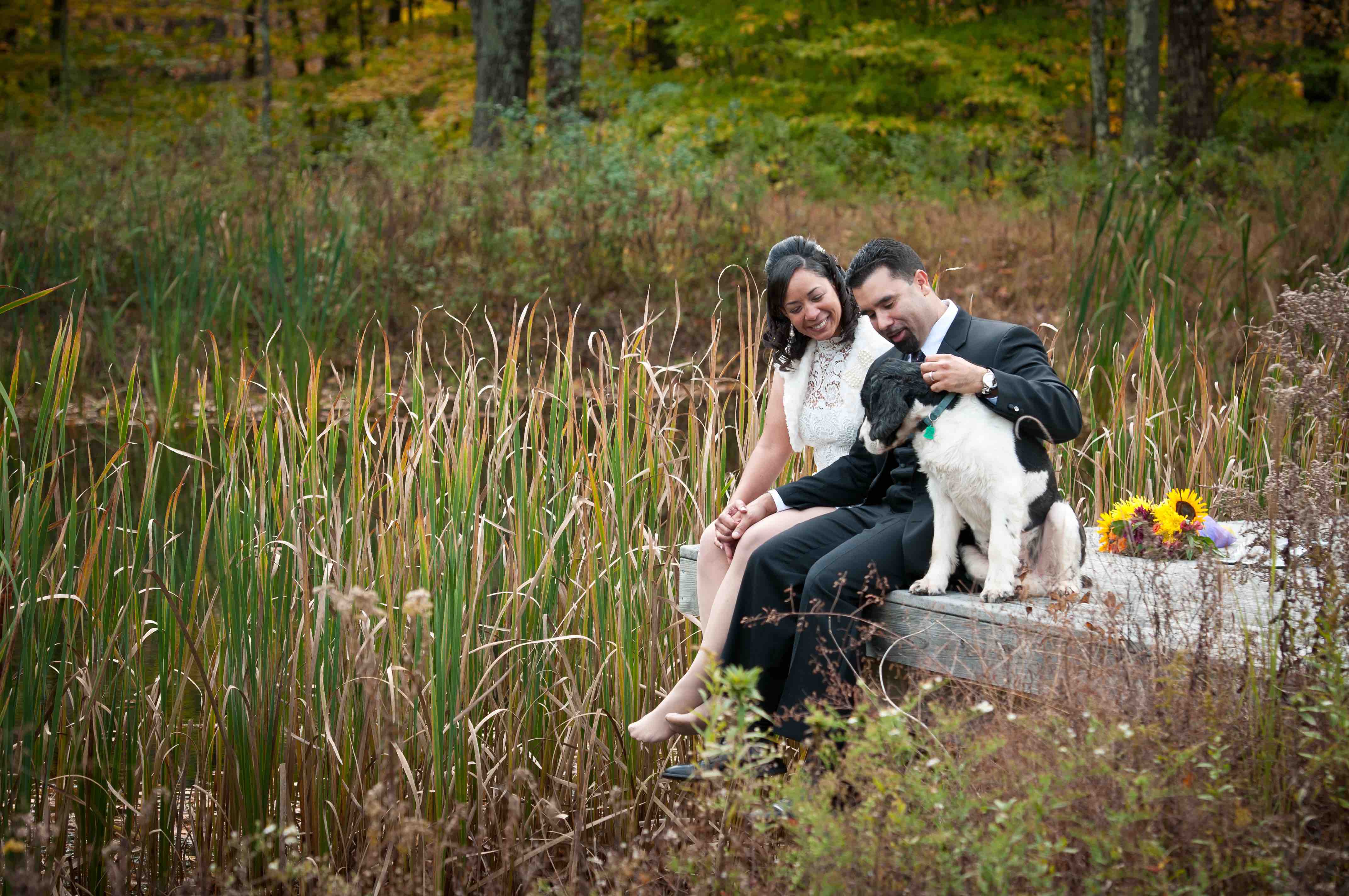
Ceremony Matters - by Lois Heckman
There is no country, culture, religion or tradition that does not celebrate marriage. As I recount here a brief history of weddings I’ll confine it to our roots in Western civilization - I couldn’t possibly explore the entire planet, this topic is big enough already! Here are some highlights.
The earliest evidence of weddings is found to be about 4,350 years ago. Anthropologists believe that before that families were loose groups of people, about 30, with several leaders and shared partners. There is evidence showing a marriage ceremony from about 2350 BC in Mesopotamia. It spread from there, being embraced by the ancient Hebrews, Greeks and Romans.
The earliest examples of wedding rings are from ancient Egypt. This tradition, traced back to those ancient Romans and Greeks, was adopted by Christians in Europe in the Middle Ages. The rings were braided or woven out of reeds or leather, but the rich and powerful had beautiful metal rings. We know this because they have been unearthed, often made of gold and jewels and can be seen in many museums.

Tossing rice and carrying bouquets have clear meaning. Because growing food and producing children was central to survival, rituals involving grains developed. You can be sure anything involving grain was used to petition the gods for successful crops and births. Bouquets, made of various herbs, were thought to promote fertility. But the fragrant bouquet was also supposed to ward off evil spirits, and cover the smell of the unwashed. Today fragrant flowers are still used, so take a deep breath and toss the rice!
Contrary to what we see in the movies and television, ancient unions had little or nothing to do with love, or even religion. It was a way to guarantee that the man’s children were his, biologically, and thus his property, and his children were his work force. Marriage also had to do with the alliances of families – bringing powerful dynasties and countries together.
Monogamy is seen as central to marriage, but historically polygamy was very common, especially in Biblical times. Men with high status could afford many wives, but most had just one. That makes sense because otherwise there wouldn’t be enough women to go around. Monogamy became the standard somewhere between the sixth and ninth centuries, as the kings and nobility battled it out on this principle with Catholic Church. Guess who won?
Speaking of the church, the next big step in the history of marriage was the rise of Roman Catholicism in Europe. By the eighth century marriage became a church sacrament. In 1563 it was written into canon law.
In an interesting contrast, ancient Judaism also negotiated marriage for alliances and property, but women did have some rights and could actually even get a divorce. The Ketubah, a marriage agreement, spelled out those rights, and is still used today. The belief that men ‘owned’ their wives persisted for centuries in almost every religious sect. Only about 250 years ago did the idea of love in marriage gain traction.
Most of our modern traditions begin with the Elizabethan era. Between 1558 and 1603 marriages were mostly still arranged and women could consent at age 12, and men at 14, but some of the customs we are familiar with began then, including the bridesmaids and groomsmen, the processional, a religious officiant, and an extravagant feast.
During our Colonial times marriage licenses appeared, invitations were sent, and the ceremony now took place in the home where a minister presided, and a nice party followed.
The Victorian area (1800’s) brought us the famous white wedding dress, along with veils and flowers, and back to church for the ceremony. A small dinner followed the ceremony, and a larger breakfast party the following day.
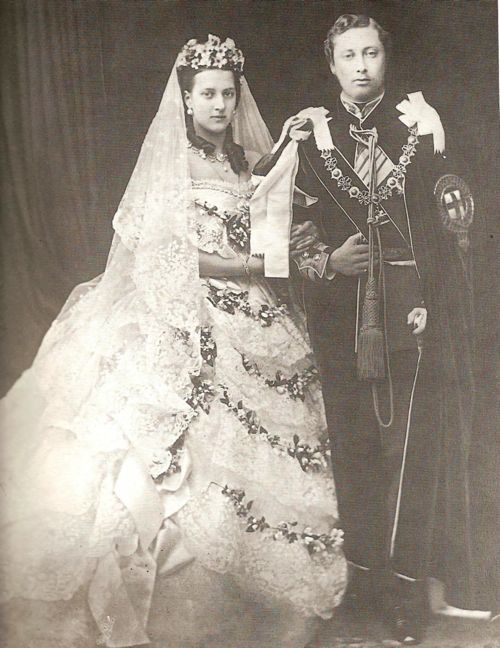
The modern wedding as we know it today really took its form after World War II. In an era of prosperity and peace, impressing your friends became important not only for the rich, but for the growing new middle class. A crucial influence was the new mass communication - newspapers and magazines, and eventually television - so that modern couples developed a shared vision of what a wedding should look like, or at least what they were told it should look like.
Efforts to legalize same-sex marriage began across our country in the 1990s, and with it challenges on the state and national levels. Civil unions for same-sex couples existed in many states but created a separate but equal standard. Massachusetts became the first state to legalize same-sex marriage with many states to follow. It became obvious that if a couple could be married in one state but not carry those rights in another state something needed to be done. On June 26, 2015, the Supreme Court decision in Obergefell v. Hodges made marriage equality the law of the land giving same-sex couples in all 50 states the right to full, equal recognition under the law.
Over the years I have officiated many elopements. There are so many reasons a couple choses to elope. But, first, what is elopement?
Originally elopement meant sneaking away to get married without the parents knowing. It was secretive and hurried. There might also be a pregnancy involved. Years back, it didn’t have the best connotation. But not so today! Sometimes the term ‘elopement’ is used when there are a handful of guests. In Pennsylvania no witnesses are required for our marriage license – so just the couple alone can do this legally! But maybe you want 10, 20 or 30 guests? Whether you call it elopement, micro-wedding, tiny wedding or minimony, having a small guest list can be exactly right for some couples.
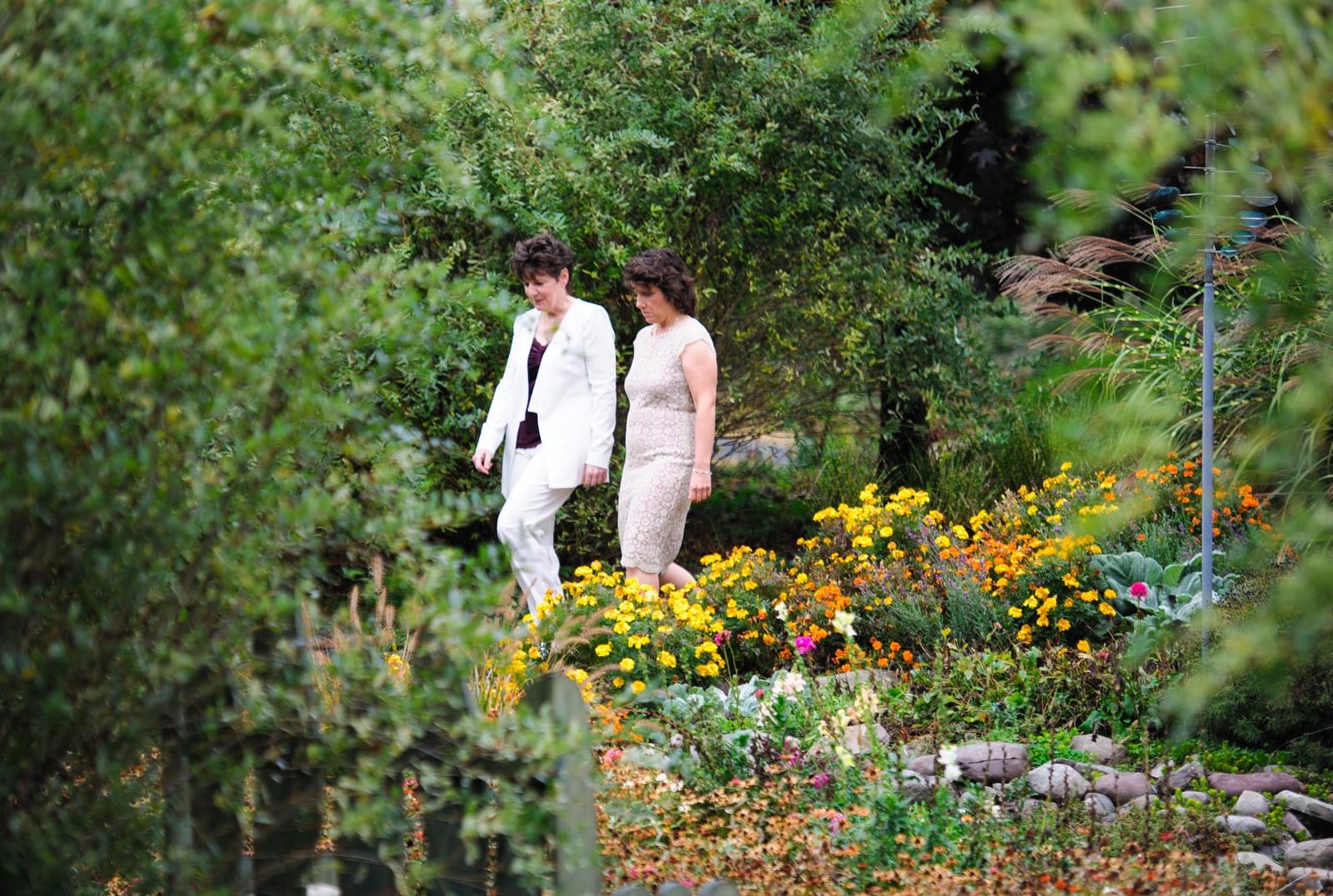
One good reason to elope is to avoid conflict. Family can be complicated. I recall one couple who had planned a nice backyard wedding at their home for their families and friends. It was a second marriage for both, and each one had several children. One day I received a call from them, asking if they could just come to my garden, just the two of them, and get married. Of course, you know I did just that. The drama had just become too much! Later, they told me, they would have some sort of party to celebrate – but eliminating the wedding formalities - the ‘who would stand where,’ the ‘who would have the rings’ and ‘who would walk with whom,’ and so much more… it was a relief to let all that go. Sometimes adding ‘wedding’ to ‘party’ makes people go crazy. Elopement does alleviate a lot of stress.
Another important reason to elope is the expense. If you cannot afford a lavish wedding you probably shouldn’t have one. Starting a marriage in debt isn’t the best idea. Or maybe you can afford it, but you choose to use that money for something else – like the honeymoon trip of a lifetime, or a down payment on a home, or paying off those student loands.
An elopement can be a romantic adventure and honeymoon rolled into one. I have friends who eloped in Mexico and had a blast.
I have my own little ceremony garden (Harmony Gardens) here in the Poconos, and lots of couples come to elope here. I provide them with ideas for places to stay and things to do, and they can create a mini-get-away. Other couples just wanted to keep it really simple, and I officiate a lovely little low-key ceremony and off they go! Nothing fancy, but still meaningful.
When you elope, you get to do so in your own style. Some women choose to wear a wedding gown, but others do not. You can be as casual or formal as you wish. There is no reason why you can't have all the glamour: the dress, the flowers, the rings – just without the guests! Some of the couples I’ve married stay at one of the several beautiful local resorts – places where other couples have large weddings. These ‘elopers’ enjoy the same amenities, from the hot-tubs and spa treatments to gorgeous rooms and lovely meals, keeping it all for themselves.
On the other hand, something fun, funky or casual is fine as well. Elope wearing jeans if you want to. Just keeping it simple is a real motivation for elopement, especially if you are more laid-back, or even shy. If you don’t enjoy people making a fuss over you or being the center of attention, a wedding can certainly create anxiety.
Planned elopements sometimes evolve into small weddings. This is not unusual. I get calls from couples who wonder if it would be ok to have a few people attend after all. You know the answer is yes! Somehow they realize they just don’t feel right depriving their parents or other important people the opportunity to be a part of this important milestone. Or the family finds out. Uh-oh!
An example that comes to mind: two brides who, intending to be secretive, let it slip and when their friends found out they were getting married they jokingly threatened to hide in the woods to watch the ceremony, if they couldn’t officially be there. The couple relented and with eight guests, everything turned out great.
I encourage everyone to find the appropriate way to tie-the-knot. It’s your wedding and your marriage and your life. You need not force yourself into something that simply isn’t for you, and eloping could be the right choice.
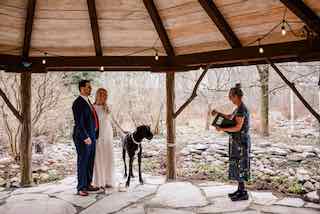
Over the years I have officiated many elopements. There are so many reasons a couple choses to elope. But, first, what is elopement?
Originally elopement meant sneaking away to get married without the parents knowing. It was secretive and hurried. There might also be a pregnancy involved. Years back, it didn’t have the best connotation. But not so today! Sometimes the term ‘elopement’ is used when there are a handful of guests. In Pennsylvania no witnesses are required for our marriage license – so just the couple alone can do this legally! But maybe you want 10, 20 or 30 guests? Whether you call it elopement, micro-wedding, tiny wedding or minimony, having a small guest list can be exactly right for some couples.

One good reason to elope is to avoid conflict. Family can be complicated. I recall one couple who had planned a nice backyard wedding at their home for their families and friends. It was a second marriage for both, and each one had several children. One day I received a call from them, asking if they could just come to my garden, just the two of them, and get married. Of course, you know I did just that. The drama had just become too much! Later, they told me, they would have some sort of party to celebrate – but eliminating the wedding formalities - the ‘who would stand where,’ the ‘who would have the rings’ and ‘who would walk with whom,’ and so much more… it was a relief to let all that go. Sometimes adding ‘wedding’ to ‘party’ makes people go crazy. Elopement does alleviate a lot of stress.
Another important reason to elope is the expense. If you cannot afford a lavish wedding you probably shouldn’t have one. Starting a marriage in debt isn’t the best idea. Or maybe you can afford it, but you choose to use that money for something else – like the honeymoon trip of a lifetime, or a down payment on a home, or paying off those student loands.
An elopement can be a romantic adventure and honeymoon rolled into one. I have friends who eloped in Mexico and had a blast.
I have my own little ceremony garden (Harmony Gardens) here in the Poconos, and lots of couples come to elope here. I provide them with ideas for places to stay and things to do, and they can create a mini-get-away. Other couples just wanted to keep it really simple, and I officiate a lovely little low-key ceremony and off they go! Nothing fancy, but still meaningful.
When you elope, you get to do so in your own style. Some women choose to wear a wedding gown, but others do not. You can be as casual or formal as you wish. There is no reason why you can't have all the glamour: the dress, the flowers, the rings – just without the guests! Some of the couples I’ve married stay at one of the several beautiful local resorts – places where other couples have large weddings. These ‘elopers’ enjoy the same amenities, from the hot-tubs and spa treatments to gorgeous rooms and lovely meals, keeping it all for themselves.
On the other hand, something fun, funky or casual is fine as well. Elope wearing jeans if you want to. Just keeping it simple is a real motivation for elopement, especially if you are more laid-back, or even shy. If you don’t enjoy people making a fuss over you or being the center of attention, a wedding can certainly create anxiety.
Planned elopements sometimes evolve into small weddings. This is not unusual. I get calls from couples who wonder if it would be ok to have a few people attend after all. You know the answer is yes! Somehow they realize they just don’t feel right depriving their parents or other important people the opportunity to be a part of this important milestone. Or the family finds out. Uh-oh!
An example that comes to mind: two brides who, intending to be secretive, let it slip and when their friends found out they were getting married they jokingly threatened to hide in the woods to watch the ceremony, if they couldn’t officially be there. The couple relented and with eight guests, everything turned out great.
I encourage everyone to find the appropriate way to tie-the-knot. It’s your wedding and your marriage and your life. You need not force yourself into something that simply isn’t for you, and eloping could be the right choice.

In a crisis it difficult to go your own way. People fall back to what they are familiar with which is often church. Choosing a celebrant for a funeral service is still rare. I want people to understand that there are different ways to come together in times of grief and pain, and that it is very important to do so. Perhaps the biggest value to any service is a sense of community and the loving support given by others.
As a Celebrant I not only officiate weddings, which are such joyous occasions, but I am called upon to officiate funerals. For simplicity I’ll use ‘funeral’ to include memorials and celebration of life services. I also perform baby welcoming’s or naming ceremonies, and other life milestones, by the way. But today I’m addressing the difficult funerals for younger people and even more so, specifically for suicide or accidental deaths.
My initial motivation in becoming a celebrant actually was funerals. When attending a funeral where the minister clearly knew nothing about the deceased, I was so upset and I knew there had to be a better way, especially for non-religious people. So off I went to study and become a celebrant.
Let me share some of my experiences in creating and performing non-religious funerals.
Most important for the most extreme and painful situations is to acknowledge the elephant in the room. I believe honesty is important and everyone is thinking about the cause of death anyway, so let’s get that out there. So after a welcome and introducing myself I dive in. I want to speak to how survivors are feeling. I know they feel guilty and helpless as well as angry or confused.
Speaking to our grief I have found these words from Ashley Davis Bush helpful:
“Grieving is not a short-term process; it's not even a long-term process; it's a lifelong process. 'Having a future' now means that although your life will flow again, it will flow differently as a result of the loss. Your grief will become incorporated into your life history, become a part of your identity. And you will continue now, and forever, to redefine your relationship with your deceased loved one. Death doesn't end the relationship, it simply forges a new type of relationship - one based not on physical presence but on memory, spirit, and love.”
I might delve deeper into the tragedy of the death before moving on to remind us that we need not define the person by their death but celebrate their life. This transition sets up the rest of the service to remember the deceased fully, who they were, who they loved and who loved them, and their accomplishments, hopes and dreams. No one should be defined by their death.
Because I know the power of ritual – and so many things in any funeral are very ritualistic – I can incorporate additional, special actions – but only if they speak to the deceased interests or identity. I have used small stones – asking people to hold them through the service and at the end we might place them somewhere meaningful. Stones can be tossed into a body of the water to go their way, making waves that intersect just as our loved one touched so many in ways we may never fully know. Or stones can be placed in a container for keeping.
Candles can be very helpful when they represent the grief, love, courage, memories and other important feelings. The meaning of each candle is spoken then lit by a special loved one.
One time we broke a ceramic bowl to free the soul in a nod to a Southwest Native American tradition. Other rituals could include flowers, water, wine, or other symbolic tangible items. Responsive readings can be powerful. For my own father’s funeral we passed out little shots of gin and ‘goldfish’ crackers – his daily tradition, and toasted him to the tunes of Frank Sinatra singing “Fly Me To The Moon.” This was so many years ago but still unforgettable.
A funeral can be as interesting and diverse as the deceased and their loved ones. I’m thinking of a ceremony a Columcille – a local megalith parks with standing stones. We broke up the ceremony into sections, walking to different areas within the park. Walking quietly in itself is a powerful thing. Upon arriving at each ‘station’ we had different readings and actions. This and many other unique services I’ve provided have confirmed my choice to become a celebrant was the right one.
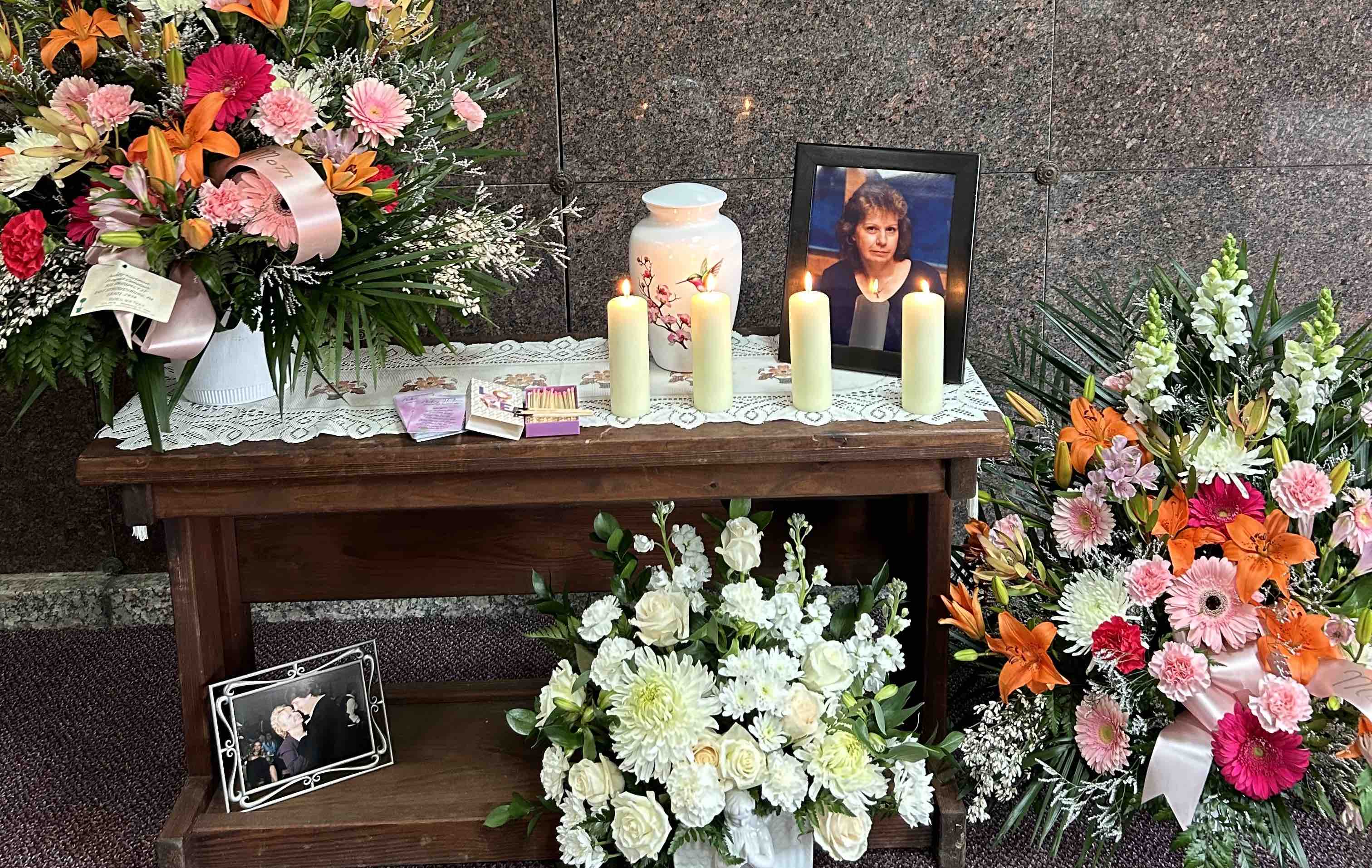
(as seen in the Pocono Record/USA Today Network)
Spiritual. This is how many people describe their beliefs. But what exactly does this mean? Literally, spiritual means ‘relating to things of the human spirit rather than material or physical things.’ But in a more religious context it can encompass a wide range of ideas.
For some it means they embrace the idea that there is more to life than what we see, while rejecting the dogma of organized religion. They feel a connection to something beyond themselves. They may call it the Divine, the Universe, the Sacred, God, or it might even remain nameless. And because spirituality can be an open-ended concept, it is not incompatible with religion or belief in God.
Gallup's 2022 Poll on Values and Beliefs finds 17% of Americans saying they do not believe in God, dipping to a new low. Other polling sources come out with similar results. But if you think everyone is honest when responding to polls, I have a nice bridge to sell you. These polls are how people self-report and I think many people are afraid to say they are not religious.
Additionally, Gallup did not offer the category ‘spiritual’ as an option. If they had, my guess is the numbers would have looked very different.
I have met with many couples who want to connect to their faith traditions, but in ways that are more compatible with a 21st century view of the world which includes science, evolved ideas on women, marriage equality and other contemporary issues.

You may recall that in 1600s Galileo came in conflict with the Catholic Church for proposing that the earth goes around the sun and not the other way around. This didn’t sit well, and he suffered greatly for his pursuit of knowledge. It’s a great example of what happens when dogma trumps progress. Ok, this isn’t the 17th century, yet modern ideas still often conflict with religious ideas, and you can find many examples of this right here right now in our country.
So how does one honor spiritual ideas and values in a wedding ceremony? There are as many ways to express it as there are different paths of spirituality itself.
Sometimes I simply make a statement of fact, saying that the couple share a sense of spirituality, and perhaps try to describe even using their words. For example, ‘they find peace and meaning in nature.’
Other times I include specific poems, excerpts or quotes from various sources that reflect their worldview. There is wisdom everywhere, and it doesn’t take long to find.

Some of my favorites sources are in poetry and literature, along with classics such as Rumi, Kahlil Gibran, Celtic writings, Lau Tzu, and Buddhist thought; but it is the couple themselves who will direct me to the right inspiration. The texts of Hinduism (the Vedas), and of course the Torah and the Bible all contain beautiful and meaningful words. There are scientists such as Neil DeGrasse Tyson. Carl Sagan, and naturalists such as John Muir, who have written eloquently about our place in the universe.
Beyond words, there are rituals that connect us to earth, air, water, fire, nature, culture, ethnicity, history, art and family. The possibilities are endless, and it’s always challenging and exciting to explore how we humans view our place in the world.
To me, being spiritual means putting great value on love and goodness in the world. What could be more beautiful than that?

(as seen in the USA Today / Pocono Record)
With the holiday season upon us – I’m thinking of all the connections between our traditions, especially as expressed through ritual. What could be more ritualistic than Christmas, Hanukkah, Kwanzaa, Solstice, or New Year’s Eve? From the more secular parts of the celebrations, such as the Christmas tree and gift exchanging, to the most holy and sacred acts of worship, the holiday season is replete with customs, traditions and rituals. Lighting candles, decorating, wrapping gifts – all become meaningful when we do it year after year, just as our parents did, and their parents before them.
Sasha Sagan writes in her book For Small Creatures Such As We: “In every inhabited corner of the Earth, human beings have created rituals to give order and meaning to existence.” I agree completely!
Old or ancient customs connect us to the continuity of life, to our faith or cultural past. New traditions bring closeness within our own families and communities right here and now. It brings joy – more of the time. Sometimes those same traditions can become more of a chore.
Wouldn’t it be great to have your very own traditions to pass down through generations? Some families do, but if you don’t, you have the opportunity to start something of your very own. Simple things like driving around to look at lights, or baking cookies are holiday favorites. Here are a few more ideas that might inspire!
Explore world customs and make ornaments, food, or craft projects that reflect another culture. Can you imagine eating latkes for a special Christmas meal? Expand your cultural awareness with the Italian Fest of the Seven Fishes. You don’t have to be Latino to enjoy tostones (fried plantains) or a coquito, which is similar to eggnog with rum.
Giving is always important. Have your family conduct a food or coat drive, or buy gifts to donate to a local shelter. But before donating anything, be sure to check first to see exactly what they need. Remember, it’s not what you want to donate, it’s what they truly need. Gift cards are often perfect because they offer people the opportunity purchase what that actually need. Adopt any cause or charity that resonates for you, and then continue to support it every year.

Start a tradition of reading. Choose a classic such as the wonderful O. Henry story The Gift of the Magi, or try poems, chapter books, or just about anything. Perhaps pick something that takes you out of your comfort zone. Everyone will be more open to the book when it’s read together. Whether it’s after the candles are lit for each of the eight nights of Hanukkah, or for the 12 days of Christmas, read every night.
Sing songs together. Not everyone is musical but most can still muster up a few tunes with the family. Sing it loud, sing it proud, and sing it every year!
Start an on-line holiday remembrance tradition, using photos or video. Mix it up with quotes from the family and the famous. Include favorite foods, special moments and even a few bloopers (but not too many, don’t embarrass anyone).
These are just a few ideas that may inspire you. I hope you will dream up your own traditions and personal rituals to add depth and new traditions to your holiday season. Happy Holidays!
(to see the column in the paper - use this link)
With the holiday season upon us our thoughts turn to the charities and causes we wish to support. It is also a time many couples become engaged. These seemingly different things go together very well. How is that? Well, this may be a little controversial, but I feel it is important that your wedding expresses not only your love for one another, but your beliefs and ideals, those causes and issues that matter the most to you.
This can even include politics because they are completely interconnected. But is it ever appropriate to have a political statement as part of your wedding? Yes and no. It doesn’t have to be expressed in a ‘which-side-are-you-on’ kind of way. You certainly don’t want to alienate any guests. But it is simply a fact that government is responsible for upholding values you may hold dear. So many important rights are deeply tied to politics! Remember, inter-racial marriage wasn’t legal until 1976 (Loving v. Virginia). It was only in 2015 that LGBT couples could legally marry throughout our country. (Obergefell v. Hodges).
One key ingredient in marriage is commitment: the promise to be there through thick and thin, to have your partner’s back. When we make this promise it is based on many things and shared values are likely one of them. Here are few examples of the way I have incorporated this over the years.
For the Declaration of Intent – the “I do” part - where you are asked to agree out-loud to go forward with the marriage. For this part of the ceremony you could add to that something like: “And do you promise to strive for peace in your home, peace in your community and peace in the world?” Or “Do you promise to work together to make this world a better place?” Something along those lines.
Or consider including thoughts about your values in your wedding vows. Here’s just one example:
I, (NAME) choose you (NAME) as my husband/wife. I promise to be compassionate, tender and loving; to be attentive and supportive of you, and to be mindful of our words and actions. I promise to live our lives positively, with joy and humor and a commitment to our values. Through our love we will strive to make this world a better place. These things I give to you today, and all the days of our lives.
Another idea is to choose a unity ritual that reflects something that resonates for you. If the environment is important to you, you might want to use water as a symbol. Make it clear you are sharing the water to express your support for clean water for all who live on this earth. Or use rocks, or other natural elements in ritualistic ways, that reflect your care for the world. You can plant a tree.
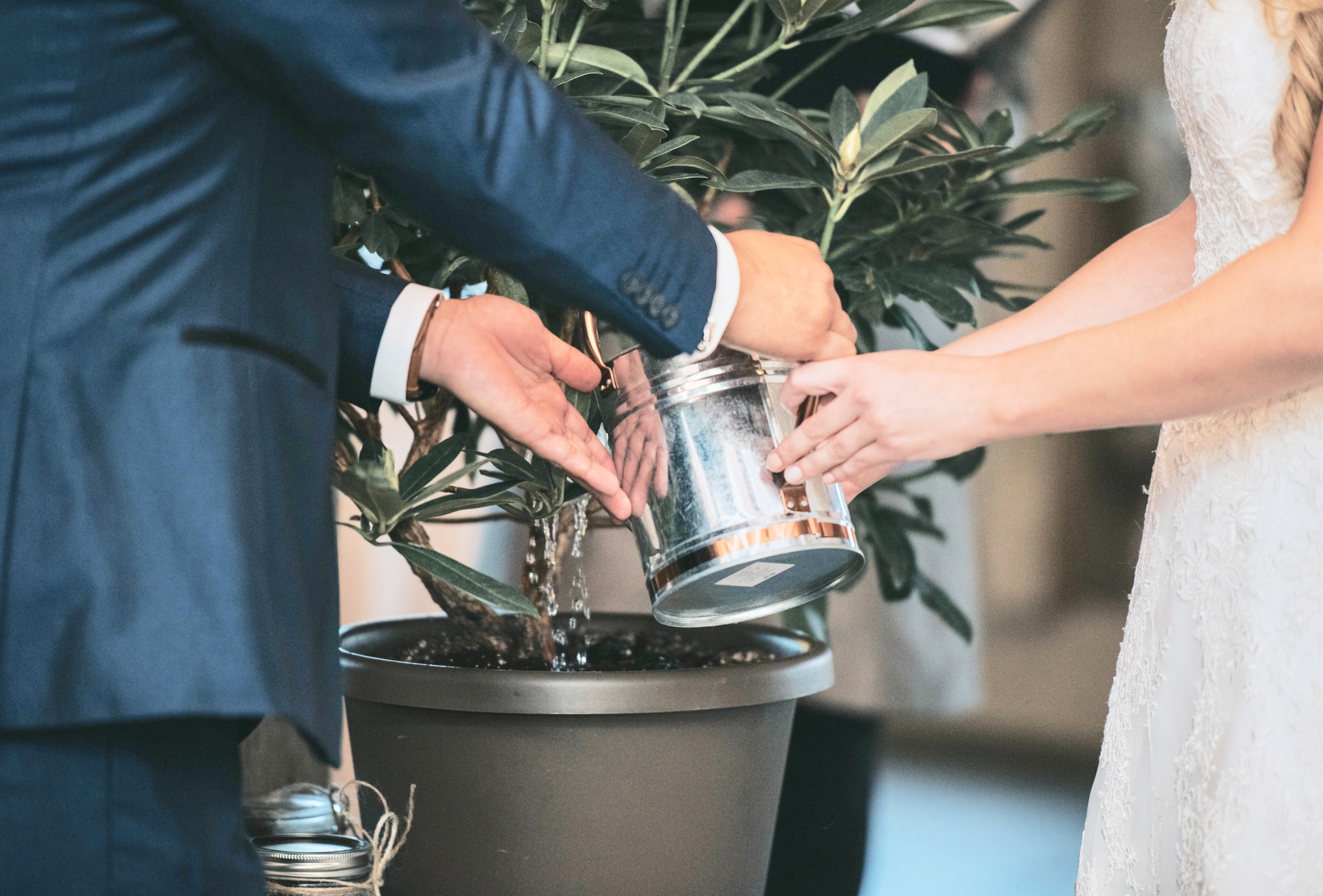
None of this is even possible if you don’t have an officiant open to these ideas. Celebrants such as myself have extensive training and know just how to create something special. Those copying ceremonies off the internet will not. Some religious leaders may balk at the idea and only want to use the prescribed liturgy. But if this is important to you, find a way to make it happen.
Obviously this isn’t going to be the dominant theme of your wedding, but slipping in a little about your worldview and convictions is a powerful thing.

Here’s an easy one. Instead of purchasing favors you can donate to a favorite cause. Be sure to let your guests know with a small note at their place setting. Let’s be honest, most people don’t really care too much about these little keepsake gifts anyway.
Finally, choosing vendors of diverse backgrounds and small businesses who support your values is another important way to express yourself. I hope this is something meaningful to think about
{You can see the column in the paper HERE}
I love Halloween, it brings out the kid in me. I always loved playing dress up. I love the freedom it gives me to be silly, a little (extra?) weird, and to try on a different persona. I also like candy.
Autumn is a great theme in itself with all the pumpkins, gourds and leaves, straw bales, pots of mums, all the seasonal décor – but taking it a step further for Halloween isn’t for everyone.
However, if a couple is the type that loves Halloween, I support them completely in embracing the scary side for their wedding. And while everything about a wedding is for real, and the honesty and meaning of a marriage commitment is something very serious, it’s also a day of celebration and fun, and Halloween is certainly fun, at least to some of us.
Consider the idea of wearing masks – and then unmasking. It can represent how we show our truest selves to the person we love. When we have an honest relationship with someone, they see us unmasked and know our deepest parts, and love us, flaws and all.
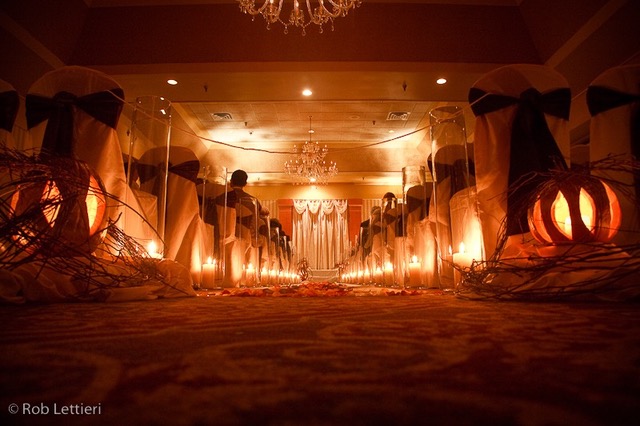
Candy comes to mind and having a candy ‘bar’ or buffet readily references trick-or-treating, and in my opinion, is a must for any Halloween wedding.
I once created a ritual using candy that speaks to the same symbolism as masks. The gave each other a special handcrafted, wrapped piece of chocolate with a center filling, and proceeded to unwrap it, as I spoke to the idea of opening oneself to the other. Then tasting it: first is the initial taste - the chocolate, a wonderful flavor of course, but then there is more - the surprise and wonder of the discovering another flavor within. I’m sure you understand this metaphor. It was a fun, meaningful and delicious ritual.
You can easily deck out the look of your wedding in Halloween fantasy, but would you wear a costume to get married? I don’t necessarily recommend it, but you might want to change into one after the ceremony, and for that matter, why not have your reception be a costume party? It doesn’t have to be child-like, a Halloween wedding can be sophisticated if done right.
I’ve seen one or two black wedding gowns and that is a perfect example of Halloween elegance. Or just add some small detail that hints at the holiday.
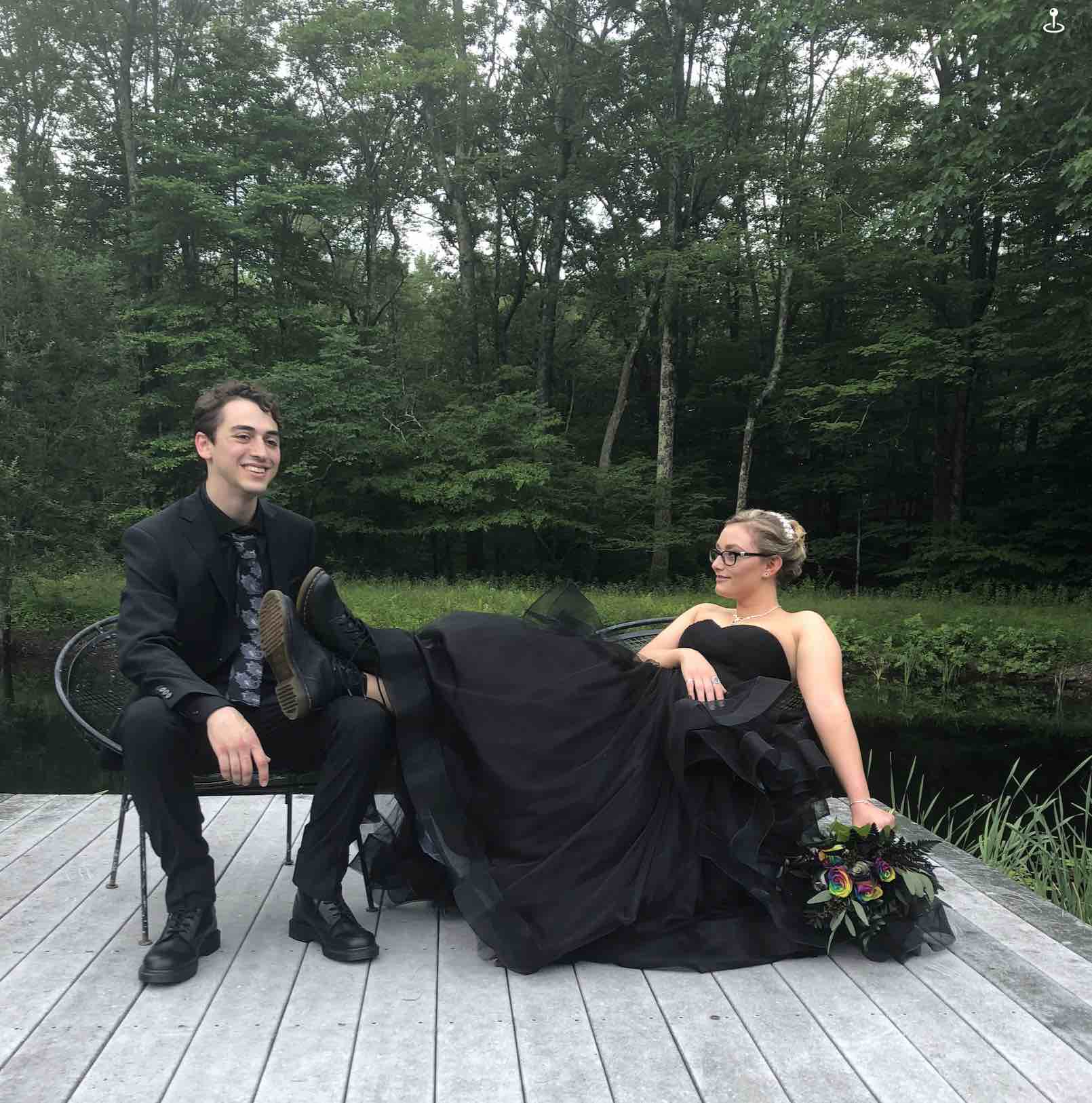
There is plenty of romance in Halloween – just look to books and movies for inspiration.
In Bram Stoker's Dracula, Dracula asks: "Do you believe in destiny? That even the powers of time can be altered for a single purpose? That the luckiest man who walks on this earth is the one who finds true love?"
Finding a spooky location for your wedding is a little more difficult. I once officiated in a former jail. It was definitely a little weird! A Victorian mansion or rustic barn lends itself well, but with the right décor anything will work.
For fun at the reception you might include a scavenger hunt, a costume contest, and having some sound effects and lighting tricks planned as well. A fake power-outage could be heart-pounding fun.
Finally, don’t miss the chance to play up the ‘til death do us part’ sentiment, along with phrases like ‘I love you to death,’ references to the Bride of Frankenstein, and arrive or leave the event in a hearse. Is that going too far?
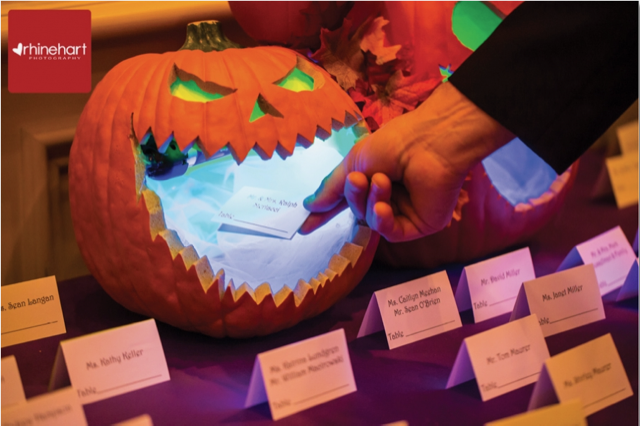
From 2006 to 2021 I wrote a column for the Pocono Record (and beyond). It feels like I must have covered everything about wedding ceremonies specifically and wedding-adjacent topics as well. But I haven’t written since the pandemic ended and as weddings come roaring back I do have a few observations to share.
I’ve been officiating 18 years now, and I’ve seen so much, but as I continue to grow in my practice as a celebrant, my clients, too, are growing. I am constantly reminded of the power of ritual, and that wedding customs extend far beyond walking down the aisle and exchanging vows and rings.
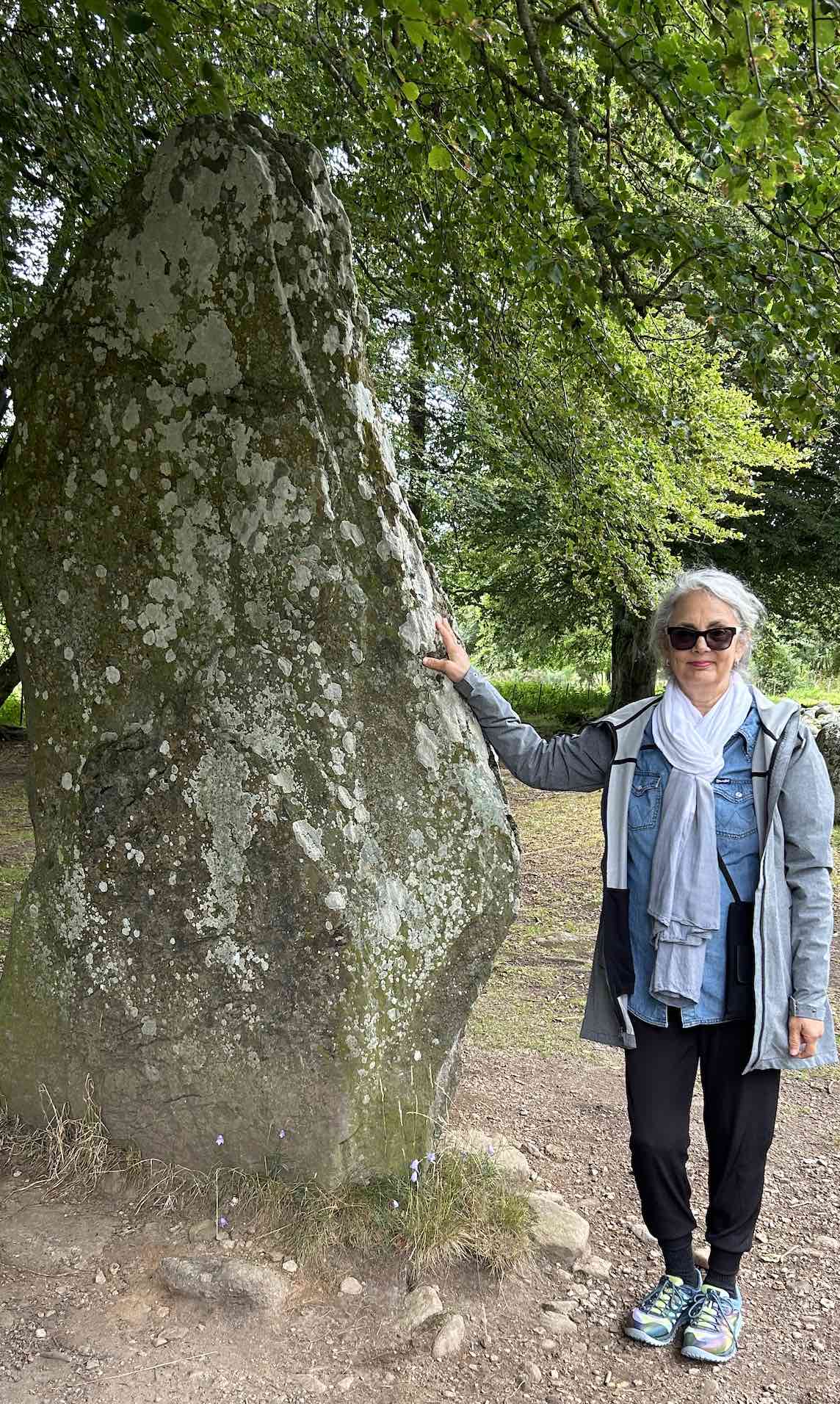 On my recent trip to Scotland with my Celebrant colleagues, I picked up a few Celtic ritual variations, especially wonderful ways to perform handfasting, aka "tying the knot." Handfasting is an ancient symbolic act and, while coming from pagan or wiccan traditions, has entered the mainstream. And for good reason. It ties (pun inten
On my recent trip to Scotland with my Celebrant colleagues, I picked up a few Celtic ritual variations, especially wonderful ways to perform handfasting, aka "tying the knot." Handfasting is an ancient symbolic act and, while coming from pagan or wiccan traditions, has entered the mainstream. And for good reason. It ties (pun inten
ded) to the past while moving the couple into their future. It’s a great action for the couple and visual for the guests. There are many ways to do it — one cord, two or three — I even have a wedding coming up with a four-cord handfasting. There also are different words that can be said to enhance the ritual. Cords can be plain or unique. Colors may represent different things, and different people can lay the cords on the couples joined hands. Not to mention the fabulous photo opportunity.
Quick story: Many years ago I ended a ceremony with "jumping the oak branch" — a more obscure Celtic tradition, not dissimilar to "jumping the broom." Some ten years later the couple told me that people still talk about that moment. Actions do speak louder than words.
Trust me, dear engaged people, when you add a unity ritual, especially something that resonates for you personally, it will create deeper meaning and lasting memories.
One final piece of advice: Don’t let others, whether family or friends, pressure you to conform. In our modern world marriage still resonates; it is meant to create a safe place to grow as individuals, partners and as a family if we so choose. And weddings are one of life’s biggest milestones, honoring the passage into your married life. Weddings are also still relevant but have also changed in many ways. Let the evolution continue!
Newly engaged? Here are a few things to think about.
It’s the holiday season – and there really are a lot of them! It’s a popular time for people to ‘pop the question.’ If you become engaged and begin planning your wedding celebration, I have a few things I’d like ask you to think about, in no particular order.
... continue here

I was speaking with a very devout Christian woman recently who was absolutely shocked I didn’t share her beliefs. She kept insisting that I would see the truth (her truth) in the end, when I was close to death. I told her it wasn’t like that for me, but she found that completely incomprehensible; it was as if I believed the sky was red. Yet for her it was the air she breathes. We certainly all hold different views on religion.... more...
I really enjoyed writing about weddings and ceremony for the USA Today Network paper via The Pocono Record, for well over 10 years. I shared a lot and I learned a lot. As I retire from that work I’m pleased to share some of my favorite columns from years past. Here’s one any couple planning a wedding should find useful.
Do you need a wedding program?
Most people planning a wedding eventually come to this question: should I have a ceremony program? As the big day approaches, I sometimes hear from ‘my’ couples, asking for the ‘order of service.’ I immediately know why. They are creating a program and want to include an outline of what will take place. This is a common practice, and in a religious ceremony it can help people get ready to find the page for the next scriptural passage or hymn. That’s ok – to a point.
But a program for your ceremony it isn’t always necessary or even desirable.
Do I really need to read ‘lighting of candles’ to know that the candles are being lit? When you think about it, the ‘order of service’ simply encourages people to anticipate what is happening next, distracting them from what is happening in the present. It becomes a checklist to be completed. I believe it is more enjoyable to allow the words and actions to unfold.
Instead, why not approach the booklet as a chance to expand and enhance the ceremony experience for your guests, rather than distract them? If you have the time and inclination, a wedding program can provide ‘added value.’
For more creative couples it can even become quite the art project! And it can serve multiple functions. Here are some suggestions to add content and value to a program:
When listing the wedding party – explain who they are, your relationship with them, or even where they live. People travel far to attend weddings. You can show your appreciation of their time and effort by making mention of it.
Use photos - of yourself, your family and friends. Even your pet who unfortunately, was unable to attend, but sends best wishes!
Get creative – the program can be made to look like a theater playbill, a menu, a newspaper, a fan, a passport, a map, a chalkboard, anything goes!
Explain rituals that are being performed. Give historical, cultural or religious background, and why it is being used. This is true for religious or secular ceremonies. Remember not everyone is versed in your traditions and will appreciate learning about them.
Give music credits – details on what songs or selections were played and what they mean to you.
If your ceremony is in a unique location – explain why you chose it.
Readings, poems, lyrics – just as with rituals - explain why you are using them in your ceremony, especially if there is particular story to accompany it. Or, include a poem, song lyric, or other writing that you could not fit into the ceremony. But don’t include the work itself if someone is reading it.
Honor family members with a tribute to them by using a meaningful quote with their name – especially poignant for those who couldn’t attend or those deceased.
For multicultural or multilingual families, have translations of some or the entire ceremony.
If children are involved in the wedding party, they can create the cover or write something special. They might also help by assembling or distributing the booklet. Don’t forget to credit children for any role they play in the wedding and thank them for their support of the marriage. They will appreciate the sentiment, and love seeing their names in print.
If you do decide to create program booklet, I hope you’ll make it special, but if you are stressed, too busy, or simply cannot take on one more task – don’t do it! While your guests may be delighted to find a program full of surprises, truly, no one will be disappointed that there is none at all.
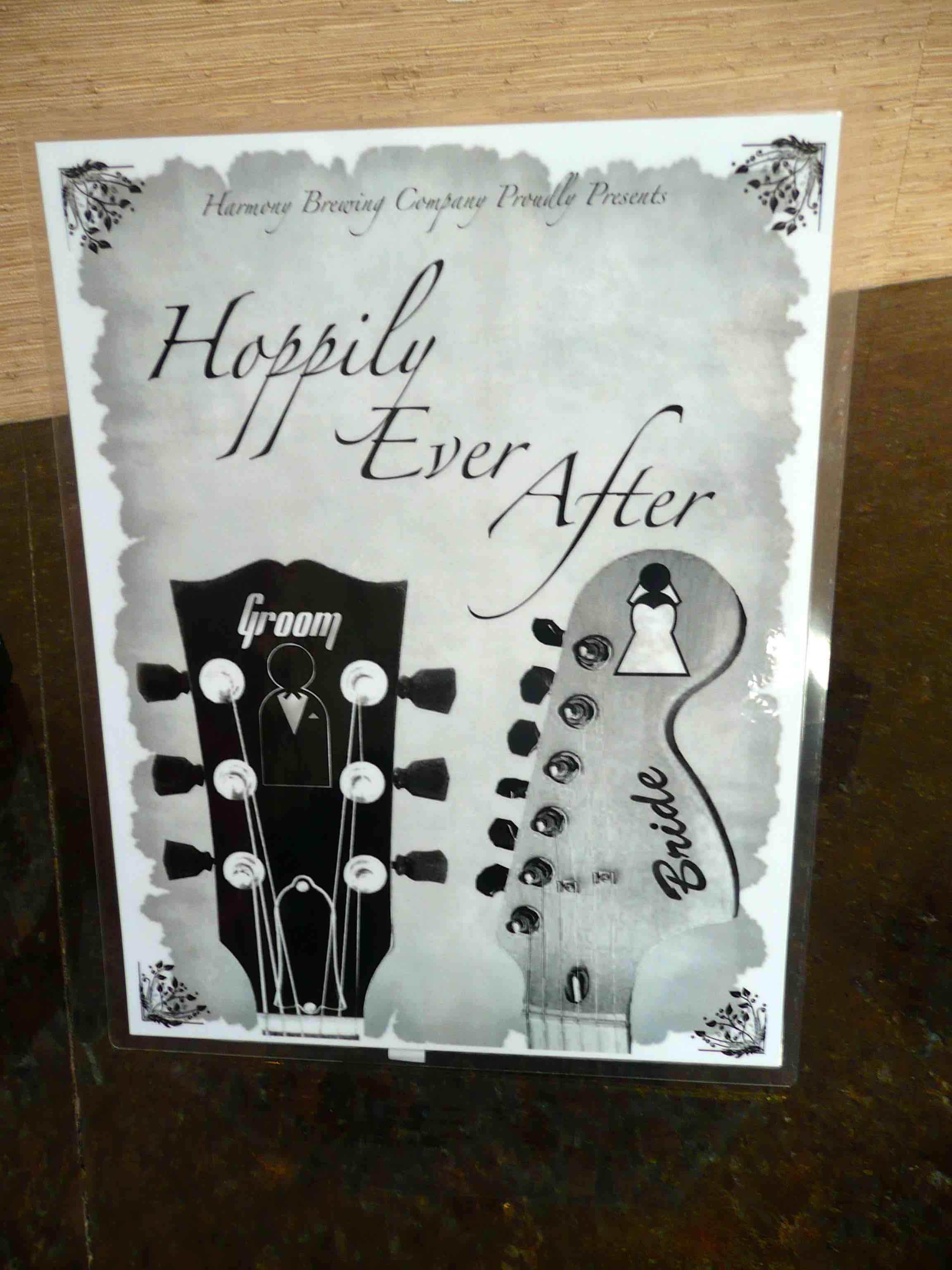
I have been writing this column for the Pocono Record since... yup - 2006 and it has finally wound down. I may have something from time to time, but for now I'll be posting some of my favorites from the past years.
I hope you enjoy them and find them useful.
Here is some of my very best advice for weddings, for guests and for couples getting married, gleaned from my 16 years as a celebrant. I’m not talking about wedding themes or colors to choose, or food selections, songs or dresses. These tips are simply practical guidance. As a couple plans a wedding, these ideas might help you enjoy the process and your wedding day.
Tips for Guests:
Be on time. I can’t tell you how often I see guests hurrying into the ceremony as it’s starting or arriving during and even afterward. If you have been invited to the ceremony, you have been invited to witness a special and even sacred time in their lives. It’s not just a party! Allow for traffic and unforeseen delays! It’s extremely rude to walk in late.
Please respond to invitations in a timely way as well.
Please note if the ceremony is outdoors and dress appropriately. You can always change your shoes and slip out of the coat later.
Turn off your phones and do not photograph the ceremony. Don’t post wedding photos until the couple has posted (unless the couple says otherwise). Professional photos are always better than your cell phone and no one wants to see someone caught off-guard. The images of someone’s wedding should be theirs to control. Sure some selfies of yourself are fine, but minimize what you share on social media, deferring to the couple’s wishes. They may have a wedding hashtag and want you to post – just check to be sure.
Tips for Couples:
Break in your shoes and be comfortable. Bring some bandaids.
Invest in an officiant who will take the time to create something that truly works for you. Weddings have professional vendors for a reason. You’re probably not making your own wedding cake or having a friend DJ for you. A professional officiant brings a lot to the table.
Select a unity ritual that resonates for you. Honor your culture (if it matters to you).
Remember that young children and dogs do not always cooperate for the ceremony. That’s ok.
If there are children involved – involve them!
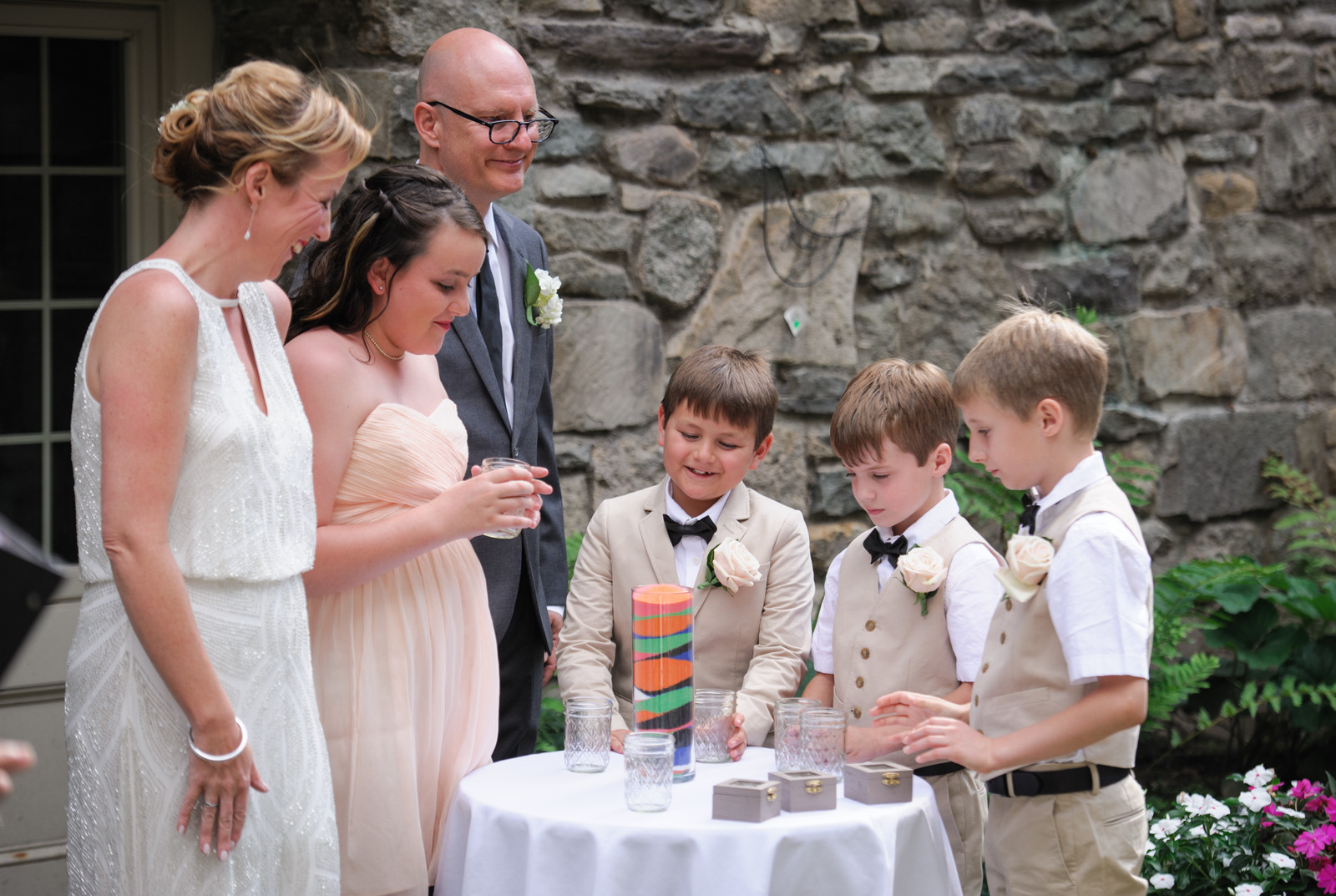
Children participate in the Sand Ceremony (Photo: Garth Woods)
Your bridesmaids/groomsmen can be whatever gender you wish – just call them attendants. And connected to that idea is that a woman can hold a ring, too, you know! I like the terms ‘best man, best woman, or best person.’
Infuse your values into your wedding day. This can be done in many ways, through words in the ceremony, with donations to charity on behalf of yourself and your guests, or with favors and gifts purchased from an organization you care about.
Treat the planning as a test for your marriage which will also have ups and downs. You must learn to navigate conflict. Be kind to each other.
Don’t obsess over the little things. If going over budget or stressing about details ask yourself: do I really need (for example) that many flowers? Do we need a wedding program, or limos? You may want these things, but if you are feeling overwhelmed, just let some things go. Figure out what matters the most to you and put your budget there. It is often good food and music.
Mind the gap between the ceremony and reception. You don’t want your guests to be bored or not know what to do with that awkward time between the two.
Be mindful of loud music during dinner. Allow people the ability to talk. Dancing can come afterwards. Seat older guests further from the music and younger ones closer.
Have a great rain plan and don’t be upset if it rains.
Don’t set unrealistic expectations about it being the ‘big day,’ you are planning for a marriage, not just a wedding.
I was reminded of this topic just the other day when a bride was struggling with the issue: shoes! I have had a complicated relationship with shoes my entire life. I love them, but my feet do not.
I recall a trip when I took a new pair of so-called comfort shoes. I was looking forward to being able to walk through the lovely small towns of Italy in great comfort. That turned out not to be the case. The lesson I keep learning over and over is to bring a pair of favorite and well-worn shoes. Shoes that are broken in. Shoes that I have history with. Shoes I know I love and that love me back.
I believe passionately that ceremony matters and writing about the meaning and depth of a rite-of-passage is important. I also know that if you are not comfortable during the ceremony, you will not fully take it in. I have officiated around 1,000 (yes, one thousand) weddings at this point, and too often I’ve seen a bride, and occasionally a groom, struggling with their shoes.
I’m amazed that a woman would buy a pair of high heels when she normally does not wear heels. I’m amazed that men rent stiff shiny shoes, shoes they have never worn before, and expect to dance the night away in them. I’m amazed that anyone will buy a gorgeous pair of shoes for their ‘big day’ and not wear them around the house for a while…wait, isn’t that what I did? So, yes, today’s column may sound trite but believe me it is not. I spend a lot of time speaking with couples about the importance of a wedding ceremony. But as they say “the devil is in the detail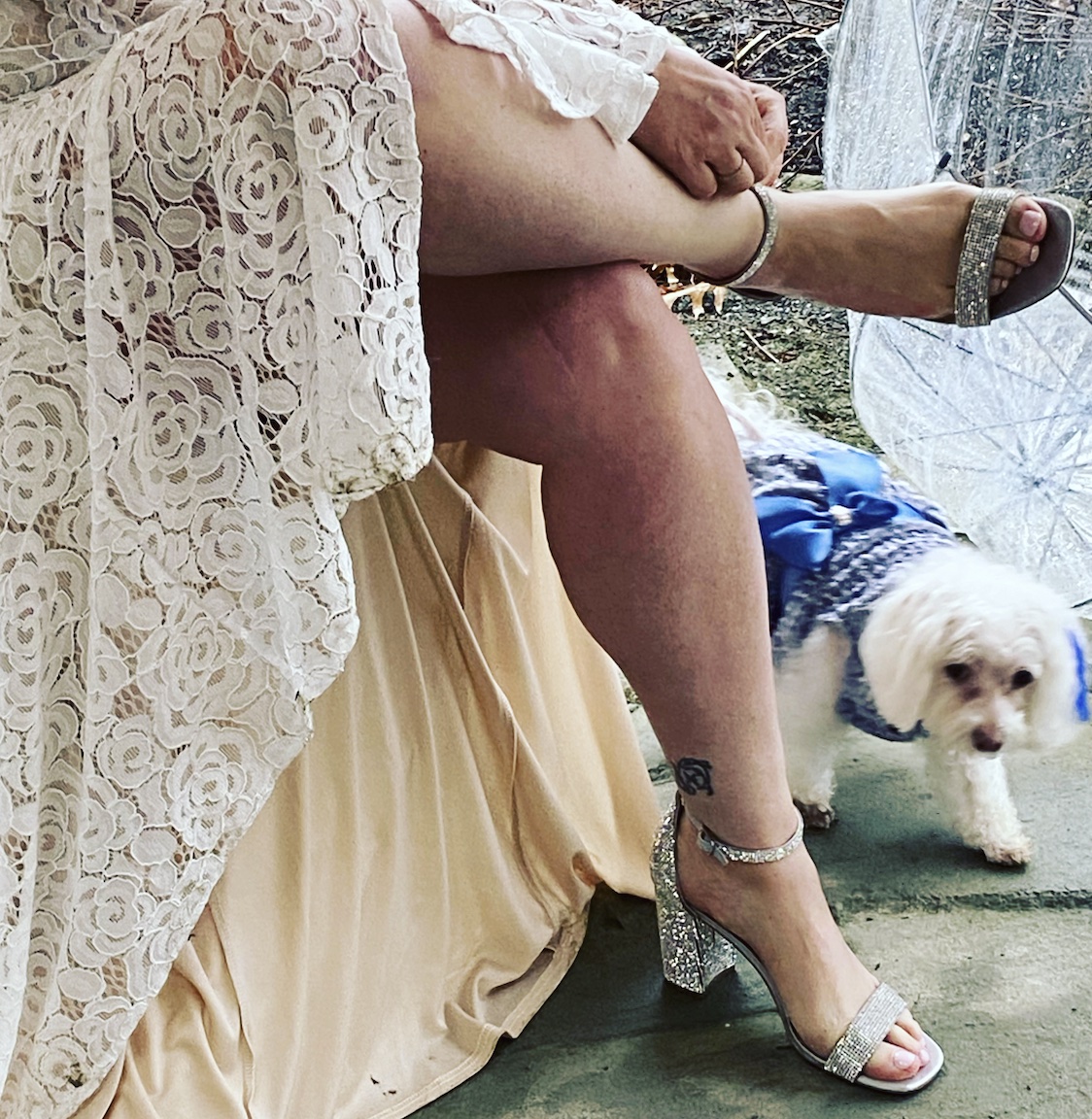 s,” and you don’t want that devil dogging you during such an important time in your life.
s,” and you don’t want that devil dogging you during such an important time in your life.
Other small things that may become large things, those devilish details, are dresses that are too long and cause you to trip or to constantly be aware of so you will not trip. Tip: try it on with those shoes you are breaking in.
Another dress disaster is not being able to use the toilet by yourself because your dress is too unwieldy. Tip: get a Bridal Buddy. Other dress issues include strapless dresses that beg to be hiked up constantly. Dresses you cannot comfortably walk it (may apply to the ‘mermaid’ style gown). And dresses that require uncomfortable under garments.
Split seams in a dress or suit can occur. Be sure to have an emergency kit that includes needle and thread, safety pins and some band aids and aspirin. You don’t have to go crazy with this – but it is good to pack a few such things.
Other problematic issues include bouquets that are too heavy to hold, or boutonnieres that ruin a vest or jacket or won’t stay upright. Tip: get one with the magnet style attachment instead of traditional pins.
And my biggest pet peeve – people playing with their phones and cameras during the ceremony. Signage is not enough, trust me on this. Have your officiant or DJ announce before the ceremony begins a gentle reminder to put away your devices. It’s just rude to play with your phone during a wedding ceremony. If you have hired (or designated) a photographer, let them take care of that. Everyone else should be paying attention not taking pictures.
Ok, that’s my rant for today. I know there are many more details that can trip you up, even literally. I’ve heard the devil wears Prada, but the devil also needs shoes to go with it.
Checklists Rock
I don’t know about you, but I’m a list maker. I take a list to the grocery store (I even have an app for that now). I often make a list of things I want to accomplish on a given day. And professionally, as a Celebrant, I certainly have a checklist for each couple I am working with, one that includes details I need so I can write the perfect ceremony because they have returned their questionnaires. Check! Other items on my list include wedding vows, marriage license, payments, ‘props’ if needed for rituals (such as candles, wine, sand, a glass for ‘breaking the glass’ or any number of things for different traditions), and a plan for the ‘big day.’
If you are planning a wedding, you will have a list even more extensive and having that checklist can provide a sense of security and accomplishment. For me, a list eases my mind. It assures me I won’t forget something important because it’s written down.
I’ve collaborated with Vicky Reddish, from The Essential Smoky Mountain Wedding Planning Guide, to come up with three versions of a checklist that we hope will be helpful for you. As you will see, they are very detailed and like all things in life and weddings, the choices are up to you. We’re just hoping to give guidance in navigating the complexities of wedding planning.
Hiring a wedding planner, if you can afford one, is a great investment. Many of the items on the checklist will be handled by him or her. It’s great to have someone overseeing everything, especially on the day of the wedding. If you are having your wedding at a venue that includes a coordinator, you may not need another one, but if there is no one on-site, it really helps.
Vicky says, “Whether you lean on a trusted friend or hire a professional, I definitely recommend having an outside party help with the details and coordinate the day of. This keeps you from stressing out over details on your big day and lets you soak it all in." That’s good advice. Being present for this rite-of-passage can be difficult but it is so important.
For a casual wedding you can ask family or close friends to help with some of the tasks. For your processional have a trusted person who is not in the processional cue everyone to enter. This makes the ceremony entrance go smoothly.
If you have your ceremony at a house of worship and the reception in another location, have directions printed out for everything and try to plan the timing of the two events so there is little down time. The wait after church and before the party can be tedious. Don’t put your guests through that. This is why many people choose to have the ceremony and reception in the same location.
Think of our checklist as your roadmap, although you may decide to take a different route, and that’s perfectly ok. You might also want to think about which partner is taking on each task. Just as your marriage will be a partnership, you want to take this on challenge as a team. Often one person leans into it more, but there is always something to help with even if your bride or groom is doing most of the work. And try not to stress. I know this is much easier said, than done, but by utilizing a checklist, you can find some ease knowing everything is in order. Good luck! Congratulations!
feel free to download the attached check lists for your use!
Between the pandemic and lots of snow, here in the Poconos we are so glad spring has arrived.
The season brings many holidays: Passover, Easter, Holi, Ramadan and Earth Day. They all involve ritual.
Rituals are prescribed actions that represent something important. Another component is that they are often repeated, for example, saying what you are thankful for at Thanksgiving dinner each year, or lighting a candle on the anniversary of a loved one’s death. Specific parts of religious practices are ritualistic— such as the Passover Seder, fasting for Ramadan, and for Christians passion plays or pageants and special Easter Sunday services come to mind.
All of the uncertainty surrounding COVID has had an effect.
I have been working with many couples who changed their wedding dates as many as three times (so far). It begs the question: Would it have been better to keep the original date and get married in a smaller gathering, or reschedule in the hope of having the wedding you intended?
photo: JillKatherinePhotography
Do not overlook or downplay it. Mourning a pet is really very important. Our pets are part of our families and when one dies it’s crushingly painful. They have often seen us through difficult times and joyous times, they are companions who never judge us and give us unconditional love. Don’t let anyone ever tell you to “just get over it” or “you’ll get another dog” (cat, whatever). Maybe you will get another pet, but the death of your animal companion, your furry or feathered friend, is a painful loss.
Happy New Year! Maybe you made some noise to welcome 2021. A big bang can be joyous, or it can be frightening. It’s as ancient and obvious as can be. We can literally break something as a symbolic action. The well-known "Breaking the Glass" ritual at a Jewish wedding is a great example, but there are other, lesser known traditions that involve ritual breaking. Here are a few examples.
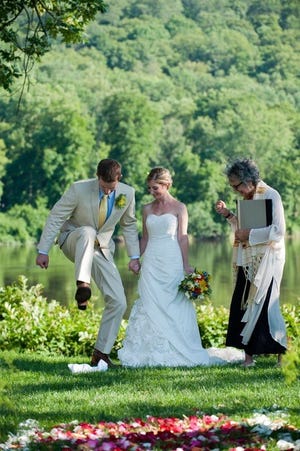
I’ve covered a lot of ground since I began writing this column way back in 2006. And it has served me well because I find weddings endlessly interesting, especially the history, customs and traditions involved. Regardless of what is happening in the world, such as the pandemic — people still need ceremonies.
As much as I love weddings, as a celebrant my work encompasses more than that. Celebrants are somewhat like religious leaders — we help individuals, couples and families honor life’s milestones. So whether you identify as religious, spiritual or nontheist, ritual is especially important during the big transitions in life.
I am happy to have a break from writing Pocono Wedding Talk – the COVID information that is provided by the Pocono Record is so much more important, and it seems frivolous to write about weddings, especially since they are mostly cancelled now anyway. But it’s been about a month since I wrote a column...
I’m going to write about weddings today, I promise, but first a little story. Once, when I wrote a letter to the editor on a political issue, I got a comment telling me to stay in my lane. The person said I should stick to writing about weddings and shut up about other things.
Aug 09, 2020
There is no hierarchy of grief, mourning or sadness. Everyone is entitled to their feelings even if others have had worse things happen. Certainly, the death of a loved one doesn’t compare to your wedding being postponed – but you are still allowed to be upset about the disruption of something you planned and dreamed about for a long time.
During difficult times, a few laughs are helpful. I was thinking about how I add a little touch of humor in wedding ceremonies and thought I’d share some of that.
Oct 04, 2020
Yes, I’m going to address this issue… again! Because it is an ongoing situation. And talk about wedding stress! This is not a crisis over a dress or flowers. COVID-19 has caused the postponement and cancellation of countless events. What if it’s your wedding? For that matter what if another emergency comes up that puts your special event into question? What do you do? How would you handle that?
NOVEMBER 22, 2020
The struggle to have safe gatherings is on-going, as the pandemic is far from tamed. The struggle to unite our country continues as well. But there are other struggles, more personal, within many families. The concept of the dysfunctional family has become a bit of a joke because everyone thinks their family is “not normal.” But what is “normal” anyway?
To read back on the many, many columns... click here and scroll down. There you will find articles on many useful topics. From wedding protocols, to cultural and religious traditions around the world.
